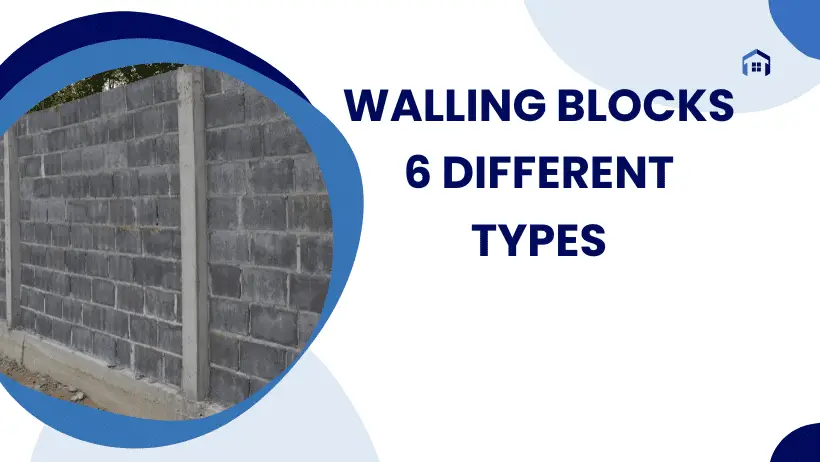There are various types of walling blocks, each with its own unique characteristics and advantages. Here are some of the most common types:
Walling Blocks the Difference Types
Concrete Blocks
Concrete blocks are made of cement, sand, and water, and come in a variety of sizes and shapes. They are durable, fire-resistant, and have good soundproofing properties.
Natural Stone
Natural stone blocks, such as granite, limestone, and sandstone, are quarried and cut into shape. They are very strong and durable, with excellent aesthetic appeal, but can be expensive.
Glass Blocks
Glass blocks are made from glass and come in a variety of colors and patterns. They are used primarily for decorative purposes and allow light to pass through.
Hollow Blocks
Hollow blocks are made of lightweight materials such as aerated concrete, which makes them easy to handle and install. They are used primarily for non-load bearing walls.
Insulated Blocks
Insulated blocks are made of materials such as polystyrene or polyurethane foam, which provide excellent thermal insulation. They are used primarily in buildings where energy efficiency is a priority.
Interlocking Blocks
Interlocking blocks are designed to fit together like puzzle pieces, which makes them easy to install without the need for mortar. They are commonly used in retaining walling and garden walls.
These are just a few of the many types of walling blocks available, and each has its own unique advantages and disadvantages. The choice of which to use will depend on factors such as the intended use, climate, budget, and aesthetic preferences.
Pros and Cons of each type of Walling Block
| Block Type | Pros | Cons |
|---|---|---|
| Concrete Blocks | Durable, fire-resistant, good soundproofing properties, available in various sizes and shapes | Not as aesthetically pleasing as other options, can be heavy and difficult to handle |
| Natural Stone | Very strong and durable, excellent aesthetic appeal, can increase property value | Expensive, difficult to work with, heavy and may require additional support |
| Glass Blocks | Decorative, allow light to pass through, available in various colors and patterns | Not as durable as other options, can be difficult to clean and maintain |
| Hollow Blocks | Lightweight and easy to handle, good for non-load bearing walls, may have good thermal insulation properties | Not as strong as solid blocks, can be more susceptible to damage and require additional support |
| Insulated Blocks | Excellent thermal insulation properties, energy-efficient, may be more environmentally friendly | Can be expensive, may not be as strong as other options |
| Interlocking Blocks | Easy to install without mortar, good for retaining walls and garden walls, available in various sizes and shapes | May not be as strong as other options, limited aesthetic appeal |
It’s important to note that the pros and cons listed above are general and may vary depending on specific brands, manufacturers, and applications of each type of walling block.
How Much do Walling Block Cost
The cost of walling blocks can vary depending on the type of block, size, quantity, and location. Here’s a general chart of the approximate cost range for each type of block
| Block Type | Approximate Cost Range (per unit) |
|---|---|
| Concrete Blocks | £1-$4 |
| Natural Stone | £6-£50 |
| Glass Blocks | £5-£30 |
| Hollow Blocks | £1-£3 |
| Insulated Blocks | £2-£8 |
| Interlocking Blocks | £1.5-£10 |
Again, it’s important to note that these prices are approximate and can vary depending on several factors such as location, quantity, and quality. Additionally, prices may vary depending on the specific supplier or manufacturer. It’s recommended to get quotes from multiple suppliers and compare prices before making a purchase decision.
There are various types of walling blocks available, including Concrete Blocks, Natural Stone, Glass Blocks, Hollow Blocks, Insulated Blocks, and Interlocking Blocks, The choice of walling block depends on various factors such as the intended use, climate, budget, and aesthetic preferences. Additionally, the cost of walling blocks varies depending on the type of block, size, quantity, and location, with prices ranging from £1 to £50 per unit
Author Profile

- I have many qualifications and certificates in construction, such as City & Guilds, CPCS and CITB. These are the highest standards of training and competence in the industry. Whether you need help with plumbing, carpentry, bricklaying or any other trade, I’m here to help you succeed.
Latest entries
- March 6, 2024CalculatorsWall Tile Calculator: How Many Wall Tiles Do You Need
- February 29, 2024Roof Truss Cost Calculator
- December 31, 2023Wage Take Home Calculator
- December 30, 2023Day Rate Calculator


Comments are closed.